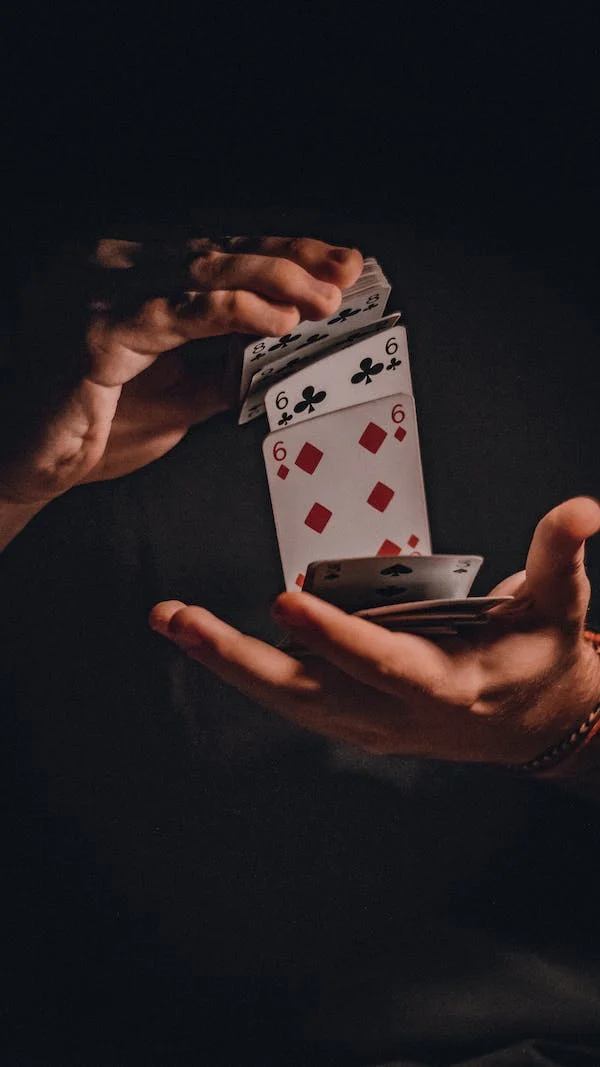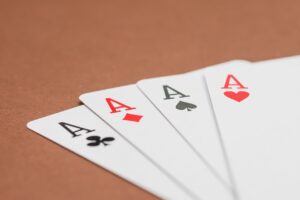Psychology plays a crucial role in the game of poker. It is not just about the cards that you hold, but also about the mindset that you bring to the table. The ability to read your opponents, control your emotions, and make rational decisions are all key factors that can determine your success in the game. In this article, we will explore the impact of psychology on poker performance and how it can help you become a better player.
The Psychology of Bluffing in Poker: How to Read Your Opponents
While mastering the technical aspects of the game is important, understanding the psychology of your opponents is equally crucial. One of the most important psychological aspects of poker is bluffing. Bluffing is the art of making your opponents believe that you have a stronger hand than you actually do. It is a powerful tool that can help you win pots even when you have a weak hand. In this article, we will explore the psychology of bluffing in poker and how to read your opponents.
Bluffing is a risky strategy that requires a lot of skill and experience. It is not something that can be learned overnight. To be successful at bluffing, you need to be able to read your opponents and understand their behavior. This is where psychology comes into play. By understanding the psychology of your opponents, you can predict their behavior and use it to your advantage.
One of the most important things to look for when trying to read your opponents is their body language. Body language can reveal a lot about a person’s thoughts and emotions. For example, if your opponent is fidgeting or looking nervous, it could be a sign that they are bluffing. On the other hand, if they are sitting still and looking confident, it could be a sign that they have a strong hand.
Another important aspect of reading your opponents is their betting patterns. If your opponent is betting aggressively, it could be a sign that they have a strong hand. However, if they are betting cautiously or checking frequently, it could be a sign that they are bluffing. By paying attention to your opponent’s betting patterns, you can get a better idea of what kind of hand they have.
It is also important to pay attention to your opponent’s verbal cues. If they are talking a lot, it could be a sign that they are nervous or trying to distract you. On the other hand, if they are quiet and focused, it could be a sign that they are confident in their hand. By listening to your opponent’s words and tone of voice, you can get a better idea of what they are thinking.
In addition to reading your opponents, it is also important to control your own behavior. Your opponents will be trying to read you just as much as you are trying to read them. If you are nervous or fidgety, it could be a sign that you are bluffing. On the other hand, if you are calm and confident, it could be a sign that you have a strong hand. By controlling your own behavior, you can make it harder for your opponents to read you.
In conclusion, the psychology of bluffing in poker is a complex and important aspect of the game. By understanding the psychology of your opponents, you can predict their behavior and use it to your advantage. Paying attention to body language, betting patterns, and verbal cues can help you get a better idea of what kind of hand your opponent has. It is also important to control your own behavior to make it harder for your opponents to read you. With practice and experience, you can become a master at reading your opponents and using psychology to win at poker.
The Impact of Emotional Control on Poker Performance
Emotional control refers to the ability to regulate one’s emotions in response to external stimuli. In the context of poker, this means being able to remain calm and focused even when facing difficult situations, such as losing a big hand or facing a tough opponent.
Research has shown that emotional control is a key predictor of poker performance. Players who are able to regulate their emotions effectively are more likely to make rational decisions and avoid costly mistakes. They are also better able to maintain their concentration and avoid distractions, which is essential in a game where even a momentary lapse in focus can be disastrous.
One of the most important aspects of emotional control in poker is the ability to manage tilt. Tilt refers to a state of emotional distress that can occur when a player experiences a series of bad beats or other negative events. Tilt can cause players to make irrational decisions, such as chasing losses or playing too aggressively, which can lead to further losses.
To avoid tilt, players need to be able to recognize when they are becoming emotionally overwhelmed and take steps to calm themselves down. This might involve taking a break from the game, practicing relaxation techniques such as deep breathing or meditation, or simply reminding oneself to stay focused on the present moment and not get caught up in past losses or future outcomes.
Another important aspect of emotional control in poker is the ability to manage anxiety. Anxiety can arise when a player is facing a high-stakes game or a particularly tough opponent. It can cause players to second-guess themselves, hesitate when making decisions, or become overly cautious in their play.
To manage anxiety, players need to be able to recognize the physical and emotional symptoms of anxiety, such as increased heart rate, sweating, or negative self-talk. They can then use techniques such as positive self-talk, visualization, or progressive muscle relaxation to calm themselves down and regain their focus.
Finally, emotional control in poker also involves the ability to manage one’s ego. Ego can cause players to become overconfident or arrogant, which can lead to reckless play and costly mistakes. It can also cause players to become defensive or argumentative when faced with criticism or feedback from others.
To manage one’s ego, players need to be able to recognize when they are becoming overly attached to their own opinions or beliefs. They can then practice humility, openness, and a willingness to learn from others. They can also seek out feedback and constructive criticism from others, and use this feedback to improve their game.
In conclusion, emotional control is a critical factor in poker performance. Players who are able to regulate their emotions effectively are more likely to make rational decisions, avoid costly mistakes, and maintain their concentration and focus. To improve their emotional control, players can practice techniques such as managing tilt, managing anxiety, and managing their ego. By doing so, they can improve their overall performance and increase their chances of success in this challenging and rewarding game.
The Role of Mindfulness in Improving Poker Strategy
Mindfulness is the practice of being present and fully engaged in the current moment. It involves paying attention to one’s thoughts, feelings, and physical sensations without judgment. In the context of poker, mindfulness can help players stay focused and make better decisions.
One of the key benefits of mindfulness is that it can help reduce stress and anxiety. Poker can be a high-pressure game, and players who are feeling stressed or anxious are more likely to make mistakes. By practicing mindfulness, players can learn to recognize when they are feeling stressed and take steps to calm themselves down. This can help them make better decisions and avoid costly mistakes.
Another benefit of mindfulness is that it can help players stay focused. In poker, it’s easy to get distracted by external factors such as other players or the environment. By practicing mindfulness, players can learn to tune out these distractions and stay focused on the task at hand. This can help them make better decisions and avoid making mistakes.
Mindfulness can also help players improve their emotional regulation. In poker, it’s common to experience a range of emotions, from excitement to frustration to disappointment. Players who are able to regulate their emotions are more likely to make rational decisions and avoid making impulsive moves. By practicing mindfulness, players can learn to recognize their emotions and respond to them in a healthy way.
One way to incorporate mindfulness into poker practice is through meditation. Meditation involves sitting quietly and focusing on one’s breath or a specific object. By doing this, players can learn to quiet their minds and stay focused. Meditation can also help players develop greater self-awareness, which can be helpful in identifying patterns of behavior or thought that may be holding them back.
Another way to practice mindfulness in poker is through visualization. Visualization involves imagining oneself in a specific situation and visualizing how one would respond. For example, a player might visualize themselves facing a difficult decision on the river and imagine how they would analyze the situation and make a decision. By doing this, players can develop greater confidence in their ability to make good decisions under pressure.
In conclusion, mindfulness can be a powerful tool for improving poker performance. By reducing stress and anxiety, staying focused, and improving emotional regulation, players can make better decisions and avoid costly mistakes. Incorporating mindfulness into poker practice through meditation and visualization can help players develop greater self-awareness and confidence. While it may not guarantee success at the poker table, mindfulness can certainly give players an edge in a game where every advantage counts.
The Connection Between Self-Confidence and Poker Success
One of the most significant psychological factors in poker is self-confidence. Self-confidence is the belief in one’s abilities and the ability to execute them effectively. In poker, self-confidence can make or break a player’s performance.
When a player lacks self-confidence, they may second-guess their decisions, hesitate to make bold moves, and ultimately play too conservatively. This can lead to missed opportunities and a failure to capitalize on advantageous situations.
On the other hand, a player with high self-confidence is more likely to make bold moves, take calculated risks, and trust their instincts. This can lead to more significant wins and a more successful overall performance.
So, how can a player improve their self-confidence at the poker table? One way is through experience. The more a player plays, the more comfortable they become with the game, and the more confident they feel in their abilities.
Another way to boost self-confidence is through preparation. A player who studies the game, learns from their mistakes, and develops a solid strategy is more likely to feel confident in their abilities.
Additionally, positive self-talk can be a powerful tool in building self-confidence. When a player tells themselves that they are capable of making the right decisions and winning the game, they are more likely to believe it and act accordingly.
However, it’s essential to note that self-confidence can also be a double-edged sword. Overconfidence can lead to reckless decisions and a failure to recognize when a player is outmatched. It’s crucial for players to find a balance between confidence and humility.
In conclusion, self-confidence is a critical factor in a player’s success at the poker table. A player who lacks confidence may miss out on opportunities and fail to capitalize on advantageous situations. On the other hand, a player with high self-confidence is more likely to make bold moves, take calculated risks, and trust their instincts. By gaining experience, preparing thoroughly, and practicing positive self-talk, players can improve their self-confidence and ultimately improve their performance at the poker table. However, it’s essential to find a balance between confidence and humility to avoid overconfidence and reckless decisions.
The Importance of Mental Toughness in High-Stakes Poker Tournaments
One of the key components of mental toughness in poker is the ability to manage emotions. In high-stakes tournaments, players are under immense pressure to perform. They may be playing for millions of dollars, and the slightest mistake can cost them dearly. This can lead to anxiety, stress, and even panic. Players who are unable to control their emotions are at a significant disadvantage.
Psychology can help players develop the mental toughness they need to succeed in high-stakes poker tournaments. One technique that is commonly used is visualization. This involves imagining oneself in different scenarios and practicing how to react. For example, a player might visualize themselves facing a tough opponent and successfully bluffing them out of a pot. By rehearsing these scenarios in their mind, players can build confidence and reduce anxiety.
Another technique that is often used is mindfulness. This involves being fully present in the moment and aware of one’s thoughts and emotions. By practicing mindfulness, players can learn to recognize when they are becoming anxious or distracted and take steps to refocus their attention. This can be particularly useful in long tournaments, where fatigue and boredom can set in.
In addition to managing emotions, mental toughness also involves the ability to make quick decisions under pressure. This requires a high level of focus and concentration. Players who are easily distracted or prone to making impulsive decisions are at a disadvantage. Psychology can help players develop the mental skills they need to stay focused and make good decisions.
One technique that is often used is goal-setting. By setting specific, measurable goals, players can stay focused on what they need to do to succeed. For example, a player might set a goal of winning a certain number of pots in a tournament or making it to a certain level. By focusing on these goals, players can stay motivated and avoid distractions.
Another technique that is commonly used is self-talk. This involves using positive affirmations to build confidence and stay focused. For example, a player might repeat the phrase “I am a skilled and confident player” to themselves before a big hand. By using positive self-talk, players can stay focused and avoid negative thoughts that can lead to anxiety and self-doubt.
In conclusion, the mental side of poker is just as important as the technical side. In high-stakes tournaments, players need to be mentally tough in order to succeed. Psychology can help players develop the mental skills they need to manage their emotions, stay focused, and make good decisions. By using techniques such as visualization, mindfulness, goal-setting, and self-talk, players can build the mental toughness they need to compete at the highest level.In conclusion, psychology plays a significant role in poker performance. It affects a player’s decision-making, emotional control, and ability to read opponents. By understanding and managing their own psychology, players can improve their game and increase their chances of winning. Additionally, studying the psychology of others can help players make better reads and predict their opponents’ actions. Overall, incorporating psychological strategies into poker gameplay can lead to greater success at the table.




